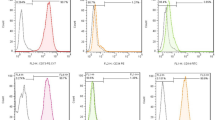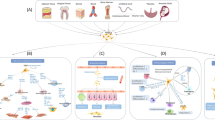Abstract
Through bioinformatics predictions, we identified that GTF2I and FAT1 were downregulated in thyroid carcinoma (TC). Further, Pearson’s correlation coefficient revealed a positive correlation between GTF2I expression and FAT1 expression. Therefore, we selected them for this present study, where the effects of bone marrow mesenchymal stem cell-derived EVs (BMSDs-EVs) enriched with GTF2I were evaluated on the epithelial–to–mesenchymal transition (EMT) and stemness maintenance in TC. The under-expression of GTF2I and FAT1 was validated in TC cell lines. Ectopically expressed GTF2I and FAT1 were found to augment malignant phenotypes of TC cells, EMT, and stemness maintenance. Mechanistic studies revealed that GTF2I bound to the promoter region of FAT1 and consequently upregulated its expression. MSC-EVs could shuttle GTF2I into TPC-1 cells, where GTF2I inhibited TC malignant phenotypes, EMT, and stemness maintenance by increasing the expression of FAT1 and facilitating the FAT1-mediated CDK4/FOXM1 downregulation. In vivo experiments confirmed that silencing of GTF2I accelerated tumor growth in nude mice. Taken together, our work suggests that GTF2I transferred by MSC-EVs confer antioncogenic effects through the FAT1/CDK4/FOXM1 axis and may be used as a promising biomarker for TC treatment.
Similar content being viewed by others
References
Bray F, Ferlay J, Soerjomataram I, Siegel RL, Torre LA, Jemal A. Global cancer statistics 2018: GLOBOCAN estimates of incidence and mortality worldwide for 36 cancers in 185 countries. CA Cancer J Clin 2018; 68(6): 394–424
Kim J, Gosnell JE, Roman SA. Geographic influences in the global rise of thyroid cancer. Nat Rev Endocrinol 2020; 16(1): 17–29
Aleksakhina SN, Kashyap A, Imyanitov EN. Mechanisms of acquired tumor drug resistance. Biochim Biophys Acta Rev Cancer 2019; 1872(2): 188310
Bocci F, Gearhart-Serna L, Boareto M, Ribeiro M, Ben-Jacob E, Devi GR, Levine H, Onuchic JN, Jolly MK. Toward understanding cancer stem cell heterogeneity in the tumor microenvironment. Proc Natl Acad Sci USA 2019; 116(1): 148–157
Pai S, Bamodu OA, Lin YK, Lin CS, Chu PY, Chien MH, Wang LS, Hsiao M, Yeh CT, Tsai JT. CD47-SIRPα signaling induces epithelial-mesenchymal transition and cancer stemness and links to a poor prognosis in patients with oral squamous cell carcinoma. Cells 2019; 8(12): 1658
Zhang Z, Wang ZX, Chen YX, Wu HX, Yin L, Zhao Q, Luo HY, Zeng ZL, Qiu MZ, Xu RH. Integrated analysis of single-cell and bulk RNA sequencing data reveals a pan-cancer stemness signature predicting immunotherapy response. Genome Med 2022; 14(1): 45
Sanmartin MC, Borzone FR, Giorello MB, Yannarelli G, Chasseing NA. Mesenchymal stromal cell-derived extracellular vesicles as biological carriers for drug delivery in cancer therapy. Front Bioeng Biotechnol 2022; 10: 882545
Hassanzadeh A, Rahman HS, Markov A, Endjun JJ, Zekiy AO, Chartrand MS, Beheshtkhoo N, Kouhbanani MAJ, Marofi F, Nikoo M, Jarahian M. Mesenchymal stem/stromal cell-derived exosomes in regenerative medicine and cancer; overview of development, challenges, and opportunities. Stem Cell Res Ther 2021; 12(1): 297
Rani S, Ryan AE, Griffin MD, Ritter T. Mesenchymal stem cell-derived extracellular vesicles: toward cell-free therapeutic applications. Mol Ther 2015; 23(5): 812–823
Qiu G, Zheng G, Ge M, Wang J, Huang R, Shu Q, Xu J. Mesenchymal stem cell-derived extracellular vesicles affect disease outcomes via transfer of microRNAs. Stem Cell Res Ther 2018; 9(1): 320
Gurumurthy A, Wu Q, Nar R, Paulsen K, Trumbull A, Fishman RC, Brand M, Strouboulis J, Qian Z, Bungert J. TFII-I/Gtf2i and erythro-megakaryopoiesis. Front Physiol 2020; 11: 590180
Nathany S, Tripathi R, Mehta A. Gene of the month: GTF2I. J Clin Pathol 2021; 74(1): 1–4
Kim IK, Rao G, Zhao X, Fan R, Avantaggiati ML, Wang Y, Zhang YW, Giaccone G. Mutant GTF2I induces cell transformation and metabolic alterations in thymic epithelial cells. Cell Death Differ 2020; 27(7): 2263–2279
Pastushenko I, Mauri F, Song Y, de Cock F, Meeusen B, Swedlund B, Impens F, Van Haver D, Opitz M, Thery M, Bareche Y, Lapouge G, Vermeersch M, Van Eycke YR, Balsat C, Decaestecker C, Sokolow Y, Hassid S, Perez-Bustillo A, Agreda-Moreno B, Rios-Buceta L, Jaen P, Redondo P, Sieira-Gil R, Millan-Cayetano JF, Sanmatrtin O, D’Haene N, Moers V, Rozzi M, Blondeau J, Lemaire S, Scozzaro S, Janssens V, De Troya M, Dubois C, Pérez-Morga D, Salmon I, Sotiriou C, Helmbacher F, Blanpain C. Fat1 deletion promotes hybrid EMT state, tumour stemness and metastasis. Nature 2021; 589(7842): 448–455
Qu N, Shi X, Zhao JJ, Guan H, Zhang TT, Wen SS, Liao T, Hu JQ, Liu WY, Wang YL, Huang S, Shi RL, Wang Y, Ji QH. Genomic and transcriptomic characterization of sporadic medullary thyroid carcinoma. Thyroid 2020; 30(7): 1025–1036
Li Z, Razavi P, Li Q, Toy W, Liu B, Ping C, Hsieh W, Sanchez-Vega F, Brown DN, Da Cruz Paula AF, Morris L, Selenica P, Eichenberger E, Shen R, Schultz N, Rosen N, Scaltriti M, Brogi E, Baselga J, Reis-Filho JS, Chandarlapaty S. Loss of the FAT1 tumor suppressor promotes resistance to CDK4/6 inhibitors via the hippo pathway. Cancer Cell 2018; 34(6): 893–905.e8
Wang X, Sun Z, Tian W, Piao C, Xie X, Zang J, Peng S, Yu X, Wang Y. S100A12 is a promising biomarker in papillary thyroid cancer. Sci Rep 2020; 10(1): 1724
Rubio C, Martínez-Fernández M, Segovia C, Lodewijk I, Suarez-Cabrera C, Segrelles C, López-Calderón F, Munera-Maravilla E, Santos M, Bernardini A, García-Escudero R, Lorz C, Gómez-Rodriguez MJ, de Velasco G, Otero I, Villacampa F, Guerrero-Ramos F, Ruiz S, de la Rosa F, Domínguez-Rodríguez S, Real FX, Malats N, Castellano D, Dueñas M, Paramio JM. CDK4/6 inhibitor as a novel therapeutic approach for advanced bladder cancer independently of RB1 status. Clin Cancer Res 2019; 25(1): 390–402
Bellelli R, Castellone MD, Garcia-Rostan G, Ugolini C, Nucera C, Sadow PM, Nappi TC, Salerno P, Cantisani MC, Basolo F, Gago TA, Salvatore G, Santoro M. FOXM1 is a molecular determinant of the mitogenic and invasive phenotype of anaplastic thyroid carcinoma. Endocr Relat Cancer 2012; 19(5): 695–710
Feng L, Yang B, Tang XD. Long noncoding RNA LINC00460 promotes carcinogenesis via sponging miR-613 in papillary thyroid carcinoma. J Cell Physiol 2019; 234(7): 11431–11439
Xia F, Chen Y, Jiang B, Du X, Peng Y, Wang W, Huang W, Feng T, Li X. Long noncoding RNA HOXA-AS2 promotes papillary thyroid cancer progression by regulating miR-520c-3p/S100A4 pathway. Cell Physiol Biochem 2018; 50(5): 1659–1672
Liao Z, Luo R, Li G, Song Y, Zhan S, Zhao K, Hua W, Zhang Y, Wu X, Yang C. Exosomes from mesenchymal stem cells modulate endoplasmic reticulum stress to protect against nucleus pulposus cell death and ameliorate intervertebral disc degeneration in vivo. Theranostics 2019; 9(14): 4084–4100
Pritchard A, Tousif S, Wang Y, Hough K, Khan S, Strenkowski J, Chacko BK, Darley-Usmar VM, Deshane JS. Lung tumor cell-derived exosomes promote M2 macrophage polarization. Cells 2020; 9(5): 1303
Fang T, Lv H, Lv G, Li T, Wang C, Han Q, Yu L, Su B, Guo L, Huang S, Cao D, Tang L, Tang S, Wu M, Yang W, Wang H. Tumor-derived exosomal miR-1247-3p induces cancer-associated fibroblast activation to foster lung metastasis of liver cancer. Nat Commun 2018; 9(1): 191
Shao XJ, Xiang SF, Chen YQ, Zhang N, Cao J, Zhu H, Yang B, Zhou Q, Ying MD, He QJ. Inhibition of M2-like macrophages by all-trans retinoic acid prevents cancer initiation and stemness in osteosarcoma cells. Acta Pharmacol Sin 2019; 40(10): 1343–1350
Dai X, Xie Y, Dong M. Cancer-associated fibroblasts derived extracellular vesicles promote angiogenesis of colorectal adenocarcinoma cells through miR-135b-5p/FOXO1 axis. Cancer Biol Ther 2022; 23(1): 76–88
Yang Y, Mao F, Guo L, Shi J, Wu M, Cheng S, Guo W. Tumor cells derived-extracellular vesicles transfer miR-3129 to promote hepatocellular carcinoma metastasis by targeting TXNIP. Dig Liver Dis 2021; 53(4): 474–485
Cui Y, Wang D, Xie M. Tumor-derived extracellular vesicles promote activation of carcinoma-associated fibroblasts and facilitate invasion and metastasis of ovarian cancer by carrying miR-630. Front Cell Dev Biol 2021; 9: 652322
Yang XZ, Cheng TT, He QJ, Lei ZY, Chi J, Tang Z, Liao QX, Zhang H, Zeng LS, Cui SZ. LINC01133 as ceRNA inhibits gastric cancer progression by sponging miR-106a-3p to regulate APC expression and the Wnt/β-catenin pathway. Mol Cancer 2018; 17(1): 126
Wei C, Yang C, Wang S, Shi D, Zhang C, Lin X, Liu Q, Dou R, Xiong B. Crosstalk between cancer cells and tumor associated macrophages is required for mesenchymal circulating tumor cell-mediated colorectal cancer metastasis. Mol Cancer 2019; 18(1): 64
Liang H, Yu T, Han Y, Jiang H, Wang C, You T, Zhao X, Shan H, Yang R, Yang L, Shan H, Gu Y. LncRNA PTAR promotes EMT and invasion-metastasis in serous ovarian cancer by competitively binding miR-101-3p to regulate ZEB1 expression. Mol Cancer 2018; 17(1): 119
Park KS, Bandeira E, Shelke GV, Lässer C, Lötvall J. Enhancement of therapeutic potential of mesenchymal stem cell-derived extracellular vesicles. Stem Cell Res Ther 2019; 10(1): 288
Wang Y, Wang G, Ma Y, Teng J, Wang Y, Cui Y, Dong Y, Shao S, Zhan Q, Liu X. FAT1, a direct transcriptional target of E2F1, suppresses cell proliferation, migration and invasion in esophageal squamous cell carcinoma. Chin J Cancer Res 2019; 31(4): 609–619
Zhou SW, Su BB, Feng YQ, Du XQ, Zhao H. Expression of GTF2IP23 in breast cancer and it mediated regulation of GTF2I. Chin J Oncol (Zhonghua Zhong Liu Za Zhi) 2019; 41(12): 918–922 (in Chinese)
Chen Y, Shao Z, Jiang E, Zhou X, Wang L, Wang H, Luo X, Chen Q, Liu K, Shang Z. CCL21/CCR7 interaction promotes EMT and enhances the stemness of OSCC via a JAK2/STAT3 signaling pathway. J Cell Physiol 2020; 235(9): 5995–6009
Xunian Z, Kalluri R. Biology and therapeutic potential of mesenchymal stem cell-derived exosomes. Cancer Sci 2020; 111(9): 3100–3110
Tang M, Wang Q, Wang K, Wang F. Mesenchymal stem cells-originated exosomal microRNA-152 impairs proliferation, invasion and migration of thyroid carcinoma cells by interacting with DPP4. J Endocrinol Invest 2020; 43(12): 1787–1796
Hu XL, Zhai YF, Li GD, Xing JF, Yang J, Bi YH, Wang J, Shi RY. FAT1 inhibits cell proliferation of esophageal squamous cell carcinoma through regulating the expression of CDK4/CDK6/CCND1 complex. Zhonghua Zhong Liu Za Zhi 2018; 40(1): 14–20 (in Chinese)
Anders L, Ke N, Hydbring P, Choi YJ, Widlund HR, Chick JM, Zhai H, Vidal M, Gygi SP, Braun P, Sicinski P. A systematic screen for CDK4/6 substrates links FOXM1 phosphorylation to senescence suppression in cancer cells. Cancer Cell 2011; 20(5): 620–634
Lopes-Ventura S, Pojo M, Matias AT, Moura MM, Marques IJ, Leite V, Cavaco BM. The efficacy of HRAS and CDK4/6 inhibitors in anaplastic thyroid cancer cell lines. J Endocrinol Invest 2019; 42(5): 527–540
Wang G, Wang X, Jin Y. LINC41410/miR-3419-5p/FOXM1 Feedback Loop Regulates Papillary Thyroid Carcinoma Cell Proliferation and Apoptosis. Cancer Biother Radiopharm 2019; 34(9): 572–580
Acknowledgements
This work was supported by Shanghai Shenkang Hospital Development Center (No. SHDC12019X38).
Author information
Authors and Affiliations
Corresponding author
Ethics declarations
Conflicts of interest Jie Shao, Wenjuan Wang, Baorui Tao, Zihao Cai, Haixia Li, and Jinhong Chen declare that they have no competing interests.
The study was conducted under the approval of the Ethics Committee of Huashan Hospital, Fudan University (Ethical code: 2019-031). The current study was approved by the Animal Ethics Committee of Huashan Hospital, Fudan University (Ethical code: 2019 JS-102) and performed according to the Guide for the Care and Use of Laboratory Animals published by the US National Institutes of Health.
Rights and permissions
About this article
Cite this article
Shao, J., Wang, W., Tao, B. et al. Extracellular vesicle-carried GTF2I from mesenchymal stem cells promotes the expression of tumor-suppressive FAT1 and inhibits stemness maintenance in thyroid carcinoma. Front. Med. 17, 1186–1203 (2023). https://doi.org/10.1007/s11684-023-0999-5
Received:
Accepted:
Published:
Issue Date:
DOI: https://doi.org/10.1007/s11684-023-0999-5




